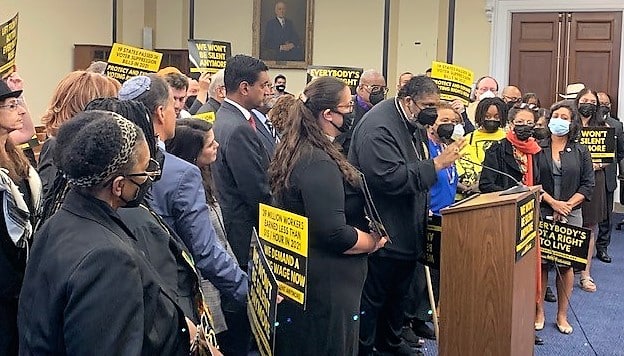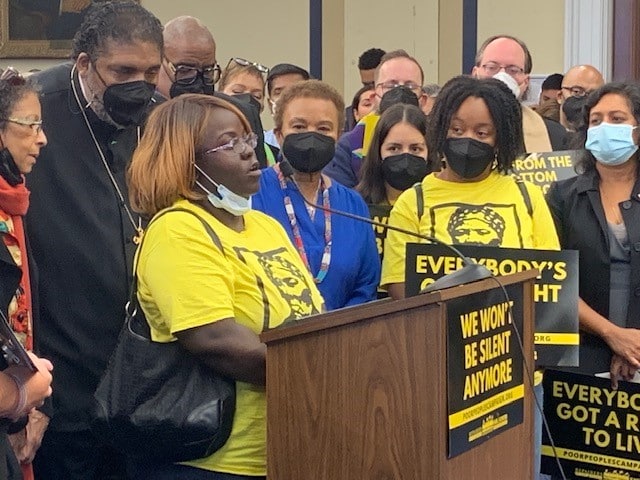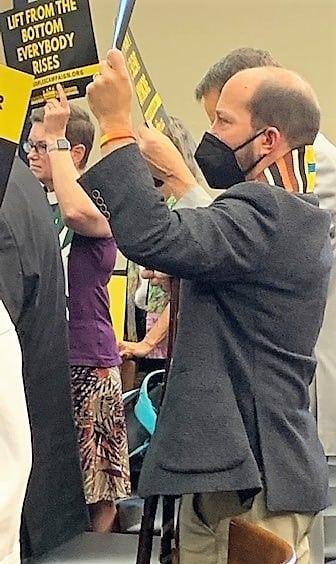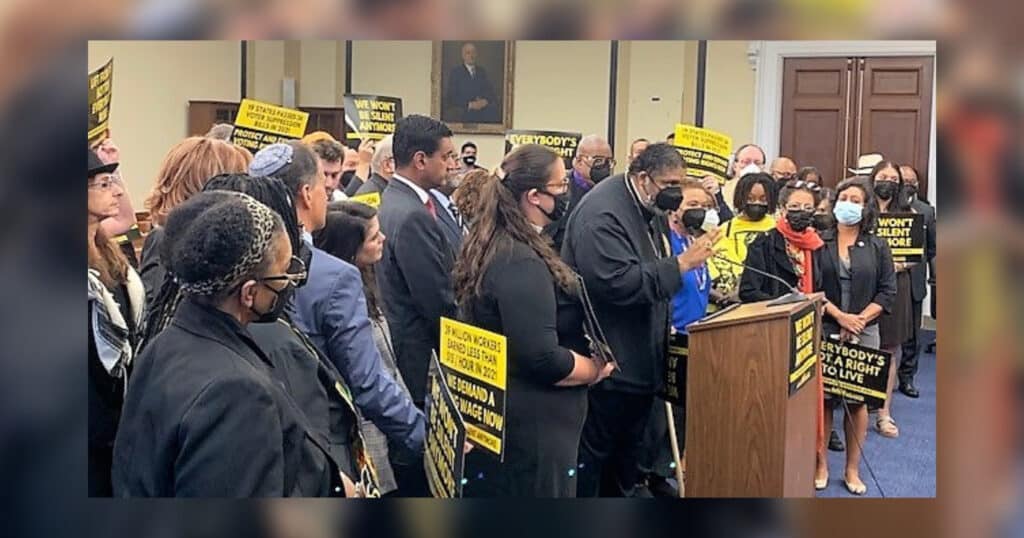Religious leaders want Congress to vote before midterms on voting rights, wages, poverty
A diverse group of faith leaders has called for Congress to vote — up or down, before the November midterm elections — on living wages, voting rights and federal policies that “can immediately lift millions of families out of poverty.”
The call came at a Sept. 22 press briefing and news conference in Washington, D.C., led by the Poor People’s Campaign. Several members of Congress stopped by the event in the Russell Senate Office Building to hear pleas from Christian, Jewish and Muslim leaders.
The Rev. William Barber III, Poor People’s Campaign co-chair and leader of the Capitol Hill gathering, called the current situation a “moral emergency.” He said floor votes before November would put senators and representatives on public record, so voters “can see where people stand.”
Sandy Sorensen, who heads the United Church of Christ’s Office of Public Policy and Advocacy, called the “emergency” language “no exaggeration.” The UCC is a longtime supporter of the Poor People’s Campaign and its policy proposals. “Over 700 people die from poverty every day in the United States, even with our abundance of resources,” she said.

‘Public policy failure’
Barber called poverty the result of a “public policy failure.” He did not specify how he hoped the issues would get to the floor of the U.S. Senate or House of Representatives. But he said the votes should include:
- Increasing the federal minimum wage from $7.25 to $15 per hour. “Fifty million people work every day without a living wage,” he said.
- Restoration of the Voting Rights Act of 1965, which was gutted by a 2013 Supreme Court decision, and passage of the For the People Act (H.R. 1), which includes provisions on voter access and election integrity.
- Restoration of pandemic relief measures that Congress allowed to expire, but that “we know worked” to relieve poverty. These include Child Income Tax Credit, a ban on evictions and others.
Because of expiring relief, “20 million people, including children, are being thrown back into poverty,” Barber said. “The pain didn’t expire. The poverty didn’t expire. The hurt didn’t expire. The hunger didn’t expire. … So we need a vote to make those things permanent.” Restoring the expanded Child Income Tax Credit “would immediately lift 4 million children out of poverty,” he said.
Barber said he wanted Congress to listen regularly to religious voices such as those present at the briefing. “We don’t want to be invited to pray anymore,” Barber said. “We want to be invited to speak at hearings.” He said the religious leaders were “here to bring a moral force that can be backed up by millions of congregants.”
‘Power in this room’
One of those voices belonged to the Rev. Teresa Hord Owens, general minister and president of the Christian Church (Disciples of Christ). “I’m committed as a Christian to building a society where all have enough,” she said.

Hord Owens said the biblical story in which Jesus fed 5,000 people is not just a miracle story, but rather a parable with an economic lesson for today. “It turns out that when we share what we all have, there is enough,” she said — and wealth is abundant enough in the U.S. for all to have what they need. She called on Congress to take actions to ensure “that this nation can be a place where all can thrive.”
It is up to Congress to “enact positive change,” said the Rev. Vashti McKenzie, interim president and general secretary of the National Council of Churches. Citing scriptures about the rights of the destitute and the poor, and telling stories of actual poor people today, she urged Congress to embrace what it has the power to do.
“There is power in this room to disrupt poverty for millions of Americans, and there is power in this room to increase their burden,” McKenzie said. “… Which way will you use your power?”
‘Too many are suffering’
The pleas were met with agreement from the handful of U.S. representatives who attended.
“Morality demands that we do more in this Congress,” said Rep. Ro Khanna of California. “Morality and faith demand that we stand up for those who are poor and low-income.”
“Too many people are suffering,” said Rep. Barbara Lee, also of California. “Too many people have died of poverty.” She is pushing a resolution she introduced in 2021 (H.R. 438), which, borrowing language from Barber and his campaign, is titled, “Third Reconstruction: Fully addressing poverty and low wages from the bottom up.” “It’s the agenda that we know will lift people out of poverty,” Lee said.

‘Soul of democracy’
Barber said poverty should get the same attention before the Nov. 8 elections as an issue that is actually getting more focus — the U.S. Capitol insurrection of Jan. 6, 2021. And, he said, it’s not just because the effects of poverty and low wealth kill nearly 250,000 people a year — many more than died in the insurrection, egregious though it was.
“The very soul of democracy could implode if we don’t deal with these issues,” Barber said. “When poor people lose hope and fall into despair, Hitlers arise,” he said. Thus, Jan. 6 could become just “a precursor” to the emergence of autocratic leadership in the U.S., he said. “None of us want to be on the side of not calling the names of the poor from the floor of the Congress and from the pulpits of this nation.”
“Poverty results from public policy decisions, and our elected leaders are making the wrong decisions,” Sorensen said. “They need to hear from all of us.”
The UCC “Our Faith Our Vote” campaign is encouraging nonpartisan engagement in the democratic process. Details and resources can be found here.
Content on ucc.org is copyrighted by the National Setting of the United Church of Christ and may be only shared according to the guidelines outlined here.
Related News
A Moment of Silence
The weekend news was alarming. Two students shot and killed with 9 injured at Brown University...
Read MoreIn hope-filled worship service, UCC and United Church of Canada celebrate full communion past and future
On Saturday, Dec. 13, many from the United Church of Christ (UCC) and the United Church of...
Read More‘A Gift of God to the World:’ Christmas greetings from the General Minister and President
As Christmas quickly approaches, UCC General Minister and President/CEO the Rev. Karen Georgia...
Read More


